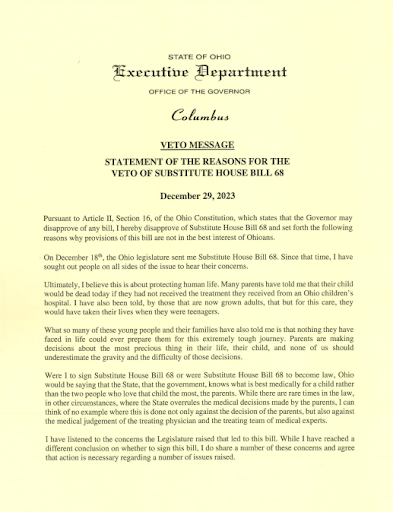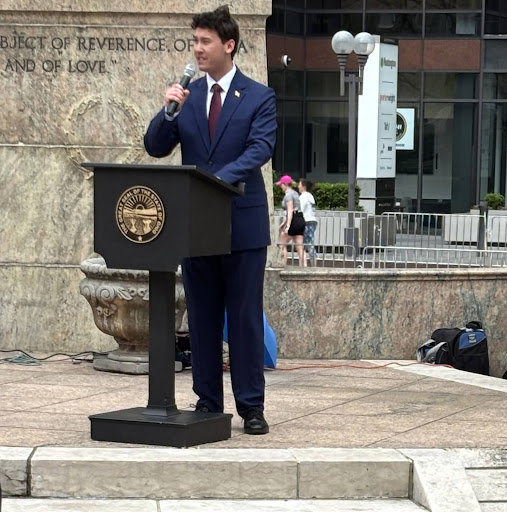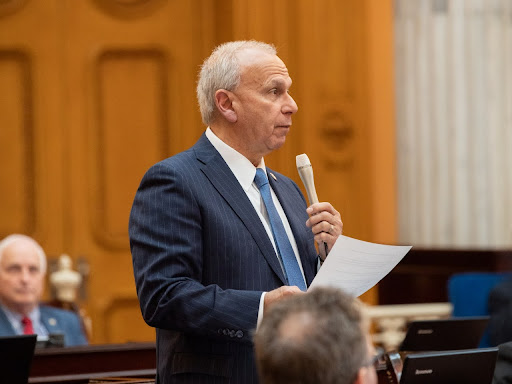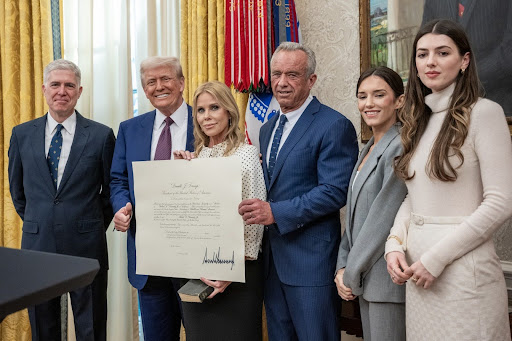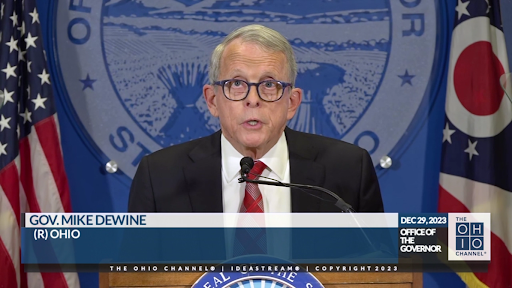
Ohio Republican Governor Mike DeWine vetoed the Saving Adolescents from Experimentation (SAFE) Act on Dec. 29th, 2023. His move resulted in overwhelming backlash from his own party and particularly the Ohio General Assembly, which is controlled by a Republican supermajority, who swore the same day to override the veto. In fact, the state legislature decided to end their holiday season early to vote on overriding the veto.
The act combined two aspects: banning gender reassignment surgeries and procedures from being able to take place on minors in the State of Ohio and enacting the Save Women’s Sports Act to disallow transgender athletes from playing on teams designated for their preferred sex as opposed to their biological ones. It was introduced by State Representative Gary Click [R-Vickery], who brought along notable athlete Riley Gaines who testified in favor of this bill.
Governor DeWine said his decision was reached after consulting with several parents of kids who dealt with this issue, who told him that their kids wouldn’t be here today were they without those surgeries. Additionally, he played the limited government card, saying that parents know their kids better than the government and that the government has no right to pretend otherwise.
“Ultimately, I believe this is about protecting human life. Many parents have told me that their child would be dead today if they had not received the treatment they received from an Ohio children’s hospital. I have also been told, by those who are now grown adults, that but for this care, they would have taken their life when they were teenagers” Governor DeWine said during his press conference. He continued reasoning before announcing his veto.
“Were I to sign House Bill 68 or were House Bill 68 to become law, Ohio would be saying that the State — that the government — knows better what is medically best for a child than the two people who love that child the most — the parents. While there are rare times in the law — in other circumstances — where the State overrules the medical decisions made by the parents, I can think of no example where this is done, not only against the decision of the parents, but also against the medical judgement of the treating physician and the treating team of medical experts. Therefore, I cannot sign this bill as it is currently written, and this morning just a few moments ago, I vetoed the bill.”
 Republicans expressed betrayal, and outrage, at Governor DeWine. Quite notably, the major men of Governor DeWine’s administration expressed outrage and disapproval with the Governor’s decision, including Lt. Governor John Husted, Secretary of State Frank LaRose, and Attorney General Dave Yost.
Republicans expressed betrayal, and outrage, at Governor DeWine. Quite notably, the major men of Governor DeWine’s administration expressed outrage and disapproval with the Governor’s decision, including Lt. Governor John Husted, Secretary of State Frank LaRose, and Attorney General Dave Yost.
“I’ve been asked my opinion on HB 68. I support it for two main reasons: Men should not compete in women’s sports. Permanent medical decisions concerning gender should not be made when you are a child. I hope the SAFE Act will become law in Ohio” Lt. Gov. Husted informed Ohioans via social media the day prior to the veto.
The National Catholic Register explained the importance of the bill, as well as the exceptions already provided within it, writing: “The legislation includes exceptions for children born with a sex development disorder or who have irrevocably ambiguous sex characteristics. It also provides exceptions for surgeries that are medically necessary to treat an infection, injury, disease, or disorder.”
Others, democratic members of Ohio’s government, praised Governor DeWine. Cincinnati Mayor, Aftab Pureval, said in a tweet, “With today’s veto of HB 68, Governor DeWine has shown true leadership. Thank you, Governor, for protecting the right of Ohioans to the healthcare they need.”
Columbus Mayor Andrew Ginther and Cleveland Mayor Justin Bibb also praised Governor DeWine. Notably, the ACLU of Ohio executive director praised Governor DeWine, which, for a republican, is a kiss of death that won’t go away.
“Lives will be saved because of this critically important veto!” said ACLU of Ohio executive director J. Bennett Guess.
A huge development that caused outrage and confusion came on January 12th when the governor signed an executive order, which achieves half of what the SAFE Act would’ve done. Governor DeWine’s office provided a news release on ohio.gov.
“Ohio Governor Mike DeWine signed Executive Order 2024-02D, which prohibits a special procedure or surgery from being performed in an office setting when that special procedure or surgery is prohibited by rule or law from being performed in a hospital or ambulatory surgical facility” the website news release read.
On January 10th, the Ohio House voted to override the Governor’s veto, and on the 24th, the Ohio Senate concurred with the House and overrode the veto, making the SAFE Act a law in the State of Ohio.

